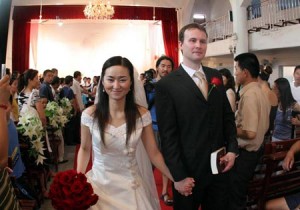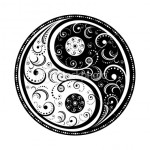Australian & Chinese couples
Adele Horin. Sydney Morning Herald. January 3, 2012
Eastern approach may keep couples from landing in divorce courts
AUSTRALIAN couples show affection, speak their mind and put high store on love and sex as essential ingredients of a happy marriage. But with one in three ending in divorce, researchers are examining whether Eastern cultures can offer some clues to more harmonious relationships.
Kim Halford, professor of psychology at the University of Queensland and lead author of the study, said Chinese couples had very low divorce rates.
”Marriage in the Western world has become very fixated on romance, passion and expression of feelings between the spouses,” he said. ”Many of the traditional Chinese marriage values are likely to make marriages happier and at lower risk of divorce.”
Research among Chinese and mixed-marriage couples in Australia has uncovered distinct views about what makes a marriage great. Co-researcher Danika Hiew said Westerners tended to talk about love and expressions of affection while Chinese emphasised working together, stressing the concept of ”togetherness”.
As well, they saw the couple as part of an extended family unit, whereas Westerners saw the couple as somewhat separate.
”One of the big differences is the Western emphasis on personal fulfilment,” said Ms Hiew. ”If you’re not being emotionally and physically fulfilled, you look elsewhere. The Chinese are more likely to ride out the rough times, working together for a common goal. It’s less about having a good time now; it’s more about compatibility and support.”
But is the Chinese prescription for harmony simply a return to the pre-1970s era when low divorce rates in Australia were often built on women’s inequality and unhappiness? Ms Hiew said Chinese values were not incompatible with an egalitarian marriage.
”Westerners tend to say exactly how they feel when they feel it. Chinese tend to edit their expressions to preserve harmony and not hurt the relationship. Taken to extremes, both views can be unhelpful.”
When Australians and Chinese marry each other, there is scope for misunderstanding. Westerners expressed affection through touch and could be upset if their Chinese partner did not hold their hand in public, Ms Hiew said. But as a Chinese man told researchers: ”Affection is when we work together. Let’s say we need to prepare food for Chinese New Year, this is where affection comes in. We work together, we clean up together.”
Michael Campbell, 74, and his wife Wang Yan Ming (Annie), 56, were in the vanguard of revolutions that convulsed their countries in the 1960s.
”I was a front-runner in the sexual revolution,” Mr Campbell said. ”Annie was part of the Cultural Revolution which was more or less anti-sex.”
Different attitudes to romance and sex were hurdles to overcome when they met 20 years ago in Sydney. But each could appreciate aspects of the other’s approach to marriage. For Mr Campbell, it was respect for marital fidelity. For Ms Wang it was the emphasis on enjoyment of life today. ”For Chinese, marriage is about having children and saving money for the children’s success,” she said. ”He didn’t want more children, he wanted to enjoy life. And I preferred that, too.”
The researchers aim to develop relationship education that includes Chinese skills and values. ”We want to include the strengths of both Eastern and Western cultures,” Ms Hiew said.


